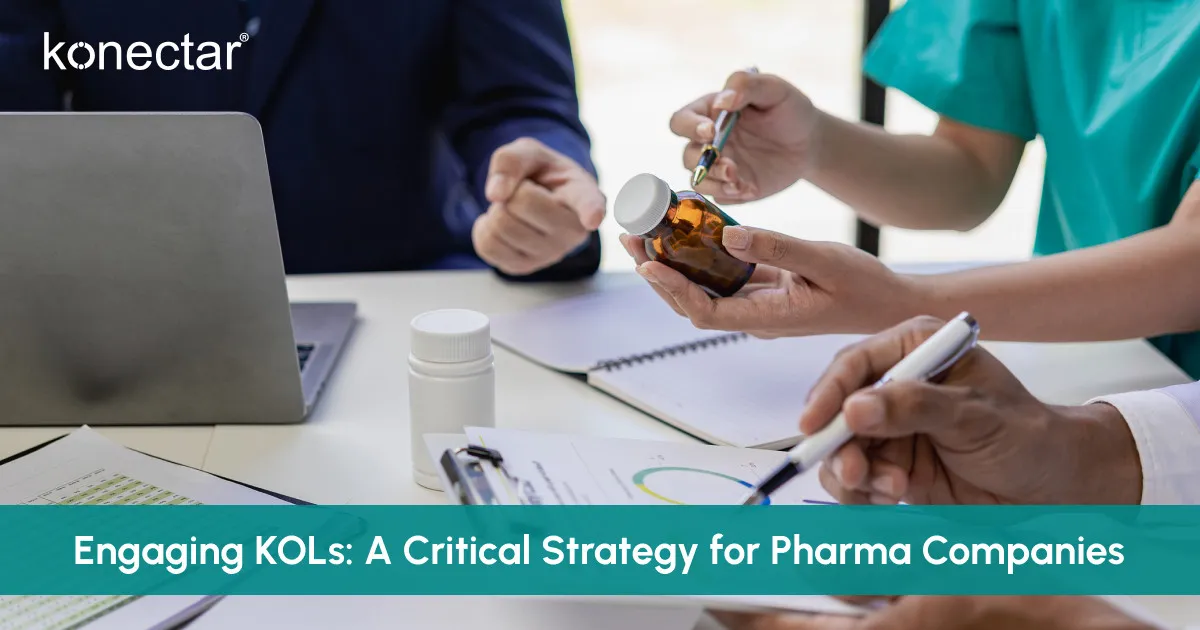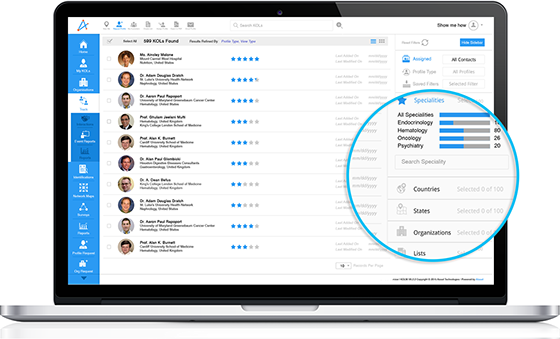21-03-2025
Engaging KOLs: A Critical Strategy for Pharma Companies

For pharmaceutical companies, engaging Key Opinion Leaders (KOLs) is not just a marketing strategy—it is a fundamental approach to building trust, enhancing credibility, and driving product adoption.
Traditionally, pharma companies identified KOLs based on their publication records, conference presence, and peer recognition. However, the methods for identifying and engaging these experts have evolved significantly. Today, companies can leverage real-time data to track emerging experts, monitor their influence, and engage them more effectively.
With AI-powered data insights, companies can go beyond conventional metrics to assess experts’ influence, their digital footprint, patient engagement, and relevance within specific therapeutic areas. This shift enables a more dynamic and responsive approach to KOL engagement, ensuring that companies collaborate with the most impactful voices in the industry.
In this article:
Defining the Purpose of KOL Engagement
Every KOL engagement strategy starts with defining why the KOL is needed. The purpose of engagement determines the type of KOLs sought and the methods used to collaborate. Broadly, top pharmaceutical companies engage KOLs for:
1. Clinical Research & Drug Development – KOLs contribute to the early phases of drug discovery by identifying unmet needs, guiding trial designs, and validating scientific data.
2. Regulatory & Market Access Support – Their insights help companies navigate regulatory approvals, reimbursement strategies, and pricing policies.
3. Medical Education & Thought Leadership – KOLs play a crucial role in disseminating clinical knowledge to healthcare professionals (HCPs) through webinars, conferences, and publications.
4. Patient-Centric Advocacy – Some KOLs, especially in rare diseases and oncology, help bridge the gap between industry and patient communities, ensuring treatments align with real-world needs.
By defining the purpose upfront, pharmaceutical companies can create tailored engagement models that yield meaningful, long-term collaborations.
Identifying the Right KOLs: Regional vs. International Experts
Once the purpose is clear, the next step is KOL identification. Pharmaceutical companies must assess whether they need regional, national, or international KOLs based on the scope of their initiative.
Regional KOLs
1. Deeply connected to local healthcare systems and regulations.
2. Influence prescribing habits and treatment protocols within a specific geography.
3. Ideal for country-specific regulatory approvals, real-world data collection, and localized marketing efforts.
International KOLs
1. Globally recognized experts with extensive publications and a strong presence in international medical societies.
2. Key drivers of scientific consensus, global clinical trial protocols, and multinational product launches.
3. Best suited for large-scale drug launches, cross-border regulatory collaborations, and global medical congresses.
A balanced approach—involving both regional and international KOLs—ensures a comprehensive impact, allowing pharma companies to tailor strategies at both local and global levels.
Profiling KOLs for Maximum Impact
Finding KOLs isn’t just about their titles or publications; it requires a multi-dimensional analysis of their influence. Key factors include:
1. Scientific Contributions – Research papers, clinical trial leadership, and conference keynote roles.
2. Digital Presence – Active engagement on social media, participation in virtual summits, and contributions to online medical platforms.
3. Industry Collaborations – Past engagements with top pharmaceutical companies and involvement in advisory boards or policy committees.
4. Peer Influence & Network Strength – Their ability to shape professional opinions within medical communities.
Modern pharma companies leverage AI-driven analytics to assess these parameters, ensuring that engagement is not only strategic but also data-driven.
Building Long-Term KOL Relationships
Once KOL profiles are identified, the next crucial step for pharma teams is to develop a structured engagement plan. Pharma teams should start by defining clear engagement goals, whether it's gathering scientific insights, enhancing brand credibility, or driving clinical advocacy.
The next step is to tailor outreach based on the KOL's expertise, communication preferences, and level of influence. Personalized engagement, whether through advisory boards, speaker opportunities, or digital collaborations, fosters meaningful relationships. It not only strengthens KOL relationships but also maximizes impact across scientific, medical, and commercial initiatives.
Some key elements of sustainable KOL engagement include:
1. Co-Creation of Scientific Content – Partnering with KOLs to develop treatment guidelines, whitepapers, and case studies.
2. Continuous Dialogue – Engaging KOLs in ongoing discussions about emerging therapies, real-world evidence, and patient outcomes.
3. Advisory Boards & Steering Committees – Forming structured groups where KOLs provide strategic direction on drug development, regulatory approaches, and market access.
4. Personalized Engagement Plans – Recognizing that each KOL has different motivations—some prefer research collaborations, while others prioritize education and public health advocacy.
Leveraging konectar, AI-Powered Platform for Smarter KOL Engagement
In the era of data-driven decision-making, konectar is revolutionizing how pharmaceutical companies identify, engage, and track KOLs. konectar provides real-time analytics on various aspects of the KOL landscape so teams can ensure that their collaborations drive scientific progress and market success. For more details on how konectar can help you succeed with your objectives, request a demo today!
FAQs
- Why is KOL engagement important for pharma companies?
KOLs help validate scientific data, influence prescribing behaviors, and enhance brand credibility.
-
What challenges do pharma teams face in KOL engagement?
Identifying the right KOLs, maintaining compliance, and ensuring sustained, meaningful interactions.
-
How can pharma companies measure the success of KOL engagement?
By tracking scientific contributions, speaking engagements, digital reach, and real-world impact.
-
What role do digital platforms play in KOL engagement?
They help pharma companies to monitor KOL activities, streamline collaborations, and optimize engagement strategies.





